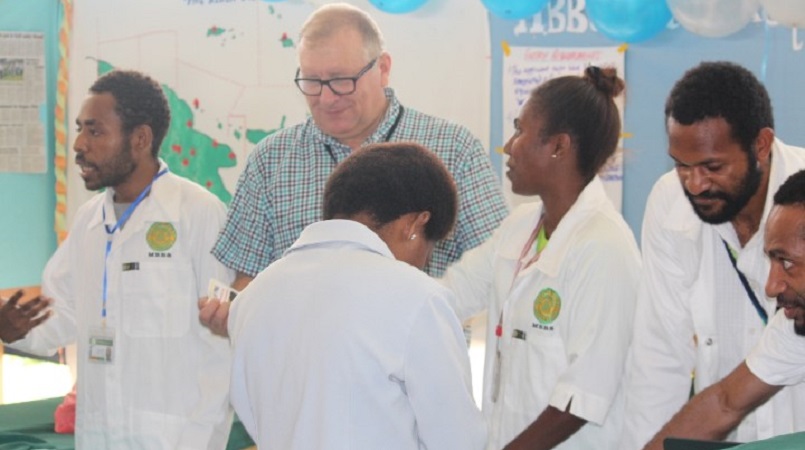
The dire need for doctors and health services in the rural parts of Papua New Guinea where the majority live was highlighted in the annual Open Day of Divine Word University in Madang last Sunday.
This message came out strongly in the displays and information provided by the pioneer Bachelor of Medicine, Bachelor of Surgery (MBBS) students of the University plus their peers in other programs in the Faculty of Medicine and Health Sciences.
The MBBS program was introduced in DWU this year with 29 pioneer students enrolled. The MBBS students were out in force at the Open Day advocating for the program and highlighted the poor health indicators that characterise PNG at this time.
According to the 2012 Health Service Delivery Report compiled by the Department of Health and the World Health Organisation “PNG has low numbers of health professionals per head of population.”
The report highlights that there were “5.3 nurses/midwives and less than 1 (one) doctor per 10,000 people.”
“Rural health services lack sufficient health workforce.”
“Many rural hospitals (in PNG) do not retain medical officers with more than 80 percent of the medical officers working in urban areas,” report stated and according to reports from last year 89 districts were without doctors.
Dean of the DWU Faculty of Medicine and Health Sciences, Dr Clement Malau said the public demand for doctors and other healthcare workers will only increase with the growth in population and PNG must plan and prepare to meet the demand.
Dr Malau said the training of doctors and other health professionals would be dictated by “demand and supply” factors and PNG must be prepared to meet face the inevitable.
He said the national health system faces a “human resource criticize” with the present number of doctors and healthcare workers unable to meet the demand for health services out there.
Dr Malau said the DWU’s MBBS program plus its sister programs in the Faculty were contributions the University was making to support the government to prepare and provide the healthcare professionals needed.
He said the MBBS program in DWU is just starting and requires the support of all partners to make it a success for the benefit of the country. Dr Malau said DWU was engaging with the Department of Health, Medical Board of PNG and other stakeholders in the country and around the world to make the programs run the cause and help the country meet the critical need for doctors.
Dr Malau said the MBBS program in DWU has been “10 years in the making” and is finally materializing with the first batch of students enrolled and with associate academic and infrastructures being developed.
Head of Department of Medicine Professor Jerzy Kuzma said among other partners DWU is partnering with Naples Frederico II Medical School, one of the oldest medical schools which successfully established a medical program in Uganda 10 years ago.
“This program in Uganda is now standing on its own,” said Prof Kuzma and DWU is proud to associate with Naples Frederico II Medical School to learn from their experiences.
He also said the MBBS program in DWU is being offered in line with World Federation for Medical Education standards.
“We are willing to talk to all stakeholders,” said Prof Kuzma in order to make the MBBS program successful for the good of the public of PNG.
